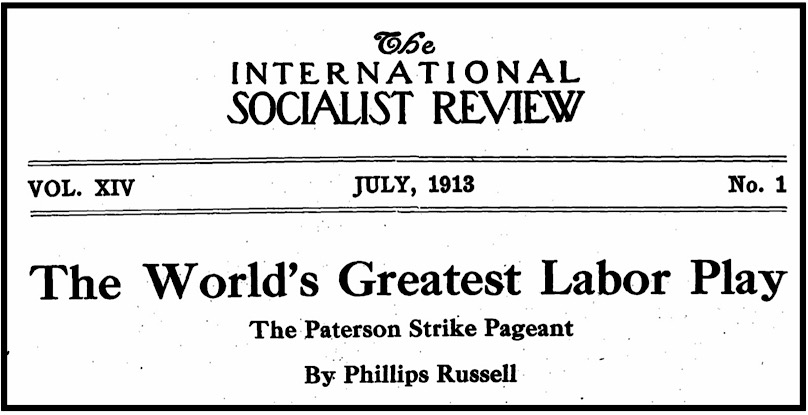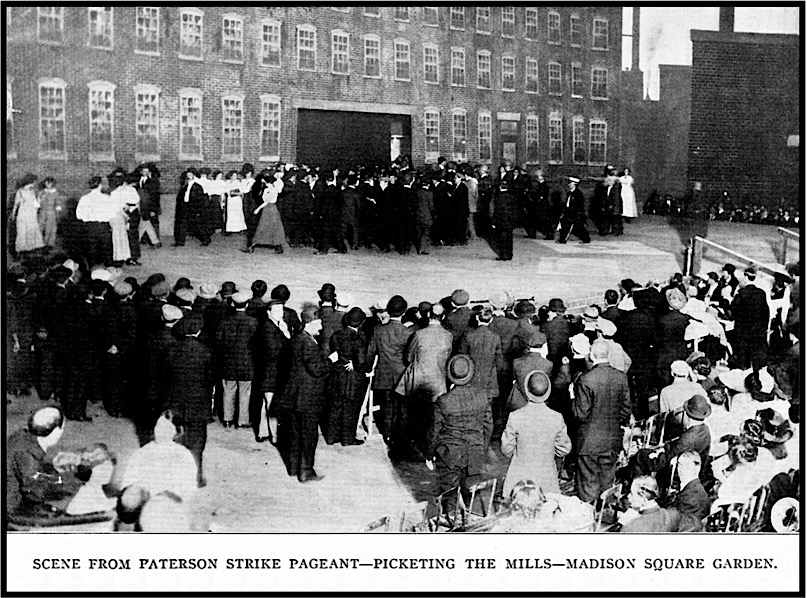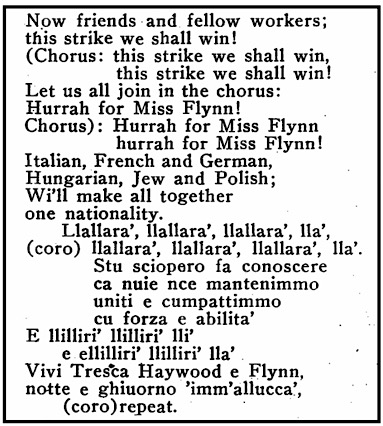
—————-
Hellraisers Journal – Wednesday July 2, 1913
“The Paterson Strike Pageant” by Phillips Russell, Part II
From the International Socialist Review of July 1913:
[Part II of II]
The New York Press the next day said:
“The Garden has held many shows and many audiences, from Dowie to Taft to Buffalo Bill, but it is doubtful if there ever was such an assemblage either as an audience or as a show as was gathered under the huge rafters last night. In fact, it was a mixed grouping that at times they converged and actor became auditor and auditor turned suddently into actor. When more than 10,000 sang and shouted within, 5,000 outside clamored for admittance and were willing to pay double the prices to get in.”
The New York Evening World said:
“Fifteen thousand specators applauded with shouts and tears the great Paterson Strike Pageant at Madison Square Garden. The big mill aglow with light in the dark hours of early winter morning, the shrieking whistles, the din of machinery-dying away to give place to the Marseillaise sung by a surging crowd of 1,200 operatives, the fierce battle with the police, the sombre funeral of the victim, the impassioned speech of the agitator, the sending away of the children, the great meeting of desperate hollow-eyed strikers-these scenes unrolled with a poignant realism that no man who saw them will ever forget.”
No spectacle enacted in New York has ever made such an impression. Not the most sanguine member of the committee which made the preparations for the pageant believed that its success would be quite so overwhelming. It is still the talk of New York, most cynical and hardened of cities, and will remain so for many days.
There were times when the committee were assailed with oppressive doubts. When one sat down and thought it over in cold blood, the idea of arranging for and carrying through such a thing in two weeks’ time seemed almost grotesque. Outside of the mechanical difficulties involved, the multitudinous details to be attended to, the advance outlay of money that would be necessary seemed to present an insuperable obstacle. There was the single item of $1,000 to be put down for the rental of one night, the $750 needed for scenery, the huge sum for advertising, all to be provided.
After plunging in with enthusiasm for the first few days, a bad reaction seized the promoters. They called a meeting in which the most gloomy forebodings were indulged in. There were disturbing reports of the small advance sale of tickets and there were serious proposals to give the whole thing up.
It was the workers themselves who stepped into the breach. Delegates from the New York silk strikers, whose cause has almost been lost sight of in the more spectacular struggle of Paterson, arose indignantly.
“What?” they cried. “Give this thing up after our people have set their hearts upon it? Never! Is it money you need? Leave it to us-we’ll raise that! We are poor. We are on strike. But a lot of us still have a few dollars left in the savings bank that we’ve been putting by through many years. We’ll get it out and lump it together. We will go to our business men and say: ‘Here, we’ve been trading with you a long time. We have helped to make your profits. Now you help us or we won’t trade with you any more.’ Never mind. You leave it to us-we will raise the money.”
And they did. Other generous people, more richly upholstered with ready cash, also came forward with contributions and in four days there was ample money with which to cover all deposits.
And it was found that the result was worth all the toil and trouble involved. The lives of most of us are sordid and grey. So tightly are we tied to the petty round of toil to which our galley-masters bind us, that most of us probably are born, live and die without experiencing one deep-springing, surging, devastating emotion. We are either afraid to feel or we have lost the capacity.
The Paterson pageant will be remembered for the sweeping emotions it shot through the atmosphere if for no other reason. Waves of almost painful emotion swept over that great audience as the summer wind converts a placid field of wheat into billowing waves. It was all real, living, and vital to them. There were veterans of many an industrial battle in that audience, though the cheeks of many still held the pink of youth.
Who could sit quietly in his seat when that mill, wonderfully portrayed on canvas in the first scene, suddenly ceased its grinding whirr and shot from its belly that mass of eddying, struggling human beings loudly chorusing their exultant war songs as they proclaimed themselves on strike? Stage managers annually spend months of toil on a “mob scene” that the Paterson strikers outclassed with a single rehearsal. As a spectacle it was perfect. Nowhere was there a suggestion of “acting,” of going through “a part.” The people on the stage had long ago forgotten the audience. The audience had long ago forgotten itself. It had become a part of the scene. All simply lived their battles over again.
Then in strong contrast came the death and burial of Modestino, killed by a detective’s bullet. There was no attempt at theatrical effect here. It was conducted with the utmost simplicity. And the Garden knew it. It held its breadth in utter silence for throbbing minutes, while Modestino’s widow, seated in a box nearby, buried her head in her hands.
There followed the reproduction of a Haledon open-air meeting, with its magic singing by the Germans and Italians. There was a chorus leader who sang in a clear, musical voice that reached the utermost parts of the Garden, and how his people did respond to him with their lyric replies! Again and again the audience demanded repetitions of these strange, wonderfully musical chants, composed and sung by the strikers themselves. The words, meaningless without the voices, went as follows:
Another vivid contrast came in the sending away of the children, with Gurley Flynn holding children, mothers on the stage and audience alike hanging on her words as if the scene was real.
The pageant was the suggestion of William D. Haywood. The scenes were arranged and staged by Ernest Poole and Thompson Buchanan, playwrights both. The difficult work of rehearsal was done by Jack Reed, the young magazine writer, who got 20 days in Paterson jail because a policeman objected to the set of his ears. The people who deserve credit for putting the pageant through are without number.
[Emphasis added.]
~~~~~~~~~~~~~~~~~~~~~~~~~
SOURCES & IMAGES
Quote BBH, IU=Socialism w Working Clothes On,
NYC Cooper Union Debate w Hillquit, Jan 11, 1912
-Sum of Jan 11 Debate w Hillquit fr NY Call p1, Jan 12
https://www.marxists.org/history/usa/pubs/the-new-york-call/1912/120112-newyorkcall-v05n012.pdf
-Source for Quote is Jan 14 Sunday Call, Stenographic Report, per:
https://books.google.com/books?id=ili0huEKAk0C&pg=PA389&dq=hillquit+haywood+debate&hl=en&newbks=1&newbks_redir=0&sa=X&ved=2ahUKEwjw2s37lI_4AhWVg3IEHdjEAa0Q6AF6BAgEEAI#v=onepage&q=%22hillquit-Haywood%20debate%22&f=false
International Socialist Review
(Chicago, Illinois)
-July 1913, page 8
https://www.marxists.org/history/usa/pubs/isr/v14n01-jul-1913-ISR-riaz-ocr.pdf
See also:
Hellraisers Journal: From the International Socialist Review:
“The Paterson Strike Pageant” by Phillips Russell, Part I
Tag: Paterson Pageant 1913
https://weneverforget.org/tag/paterson-pageant-1913/
Tag: Paterson Silk Strike of 1913
https://weneverforget.org/tag/paterson-silk-strike-of-1913/
~~~~~~~~~~~~~~~~~~~~~~~~~



